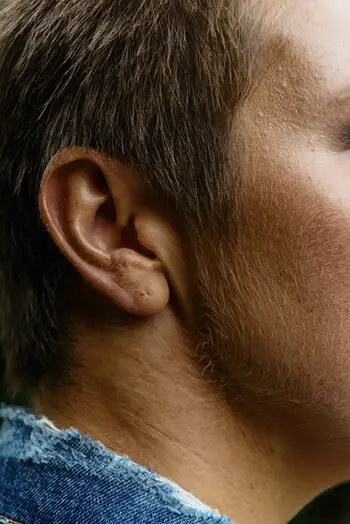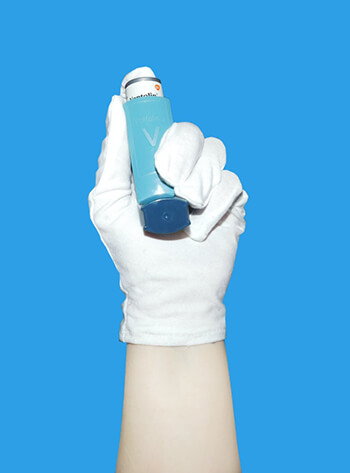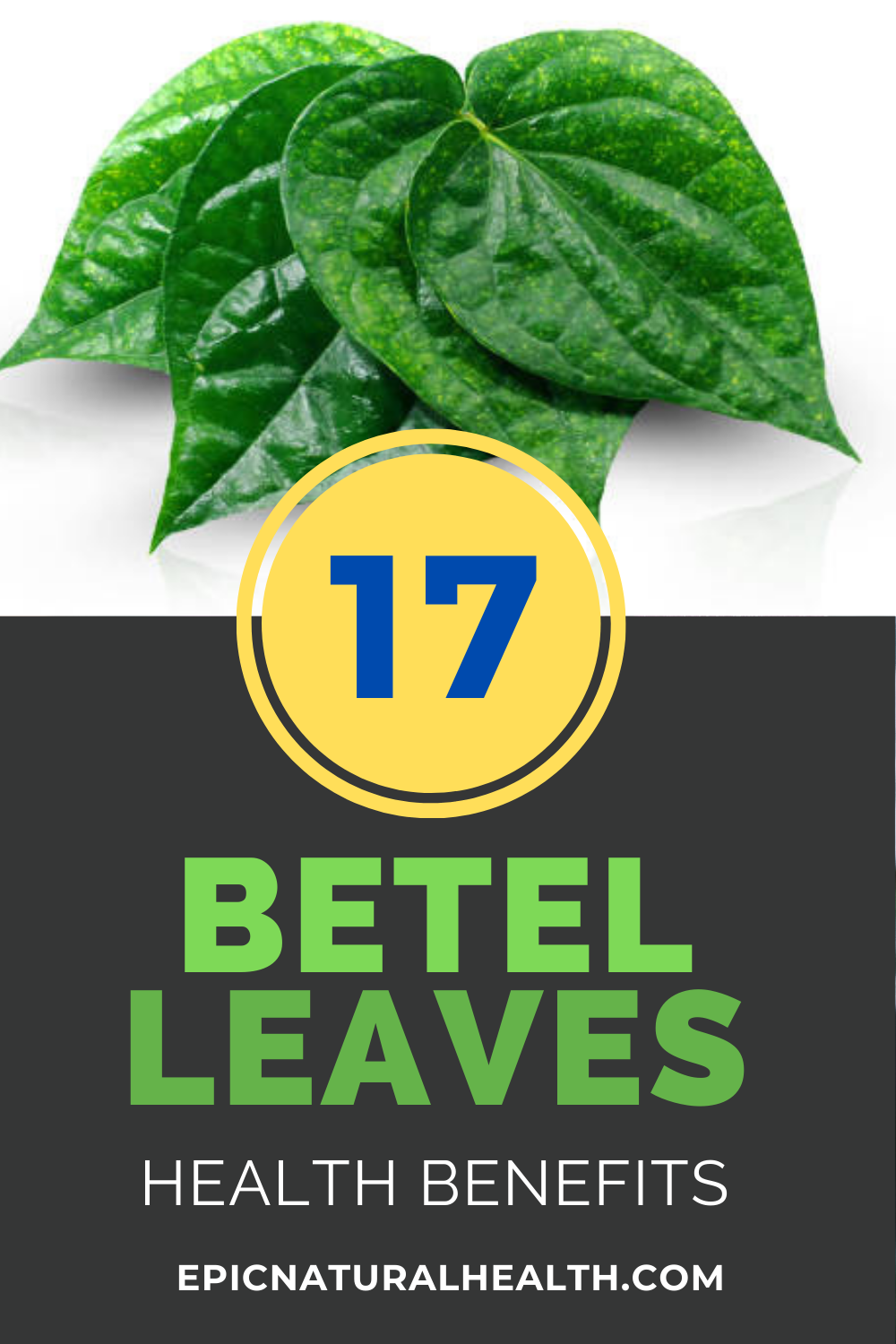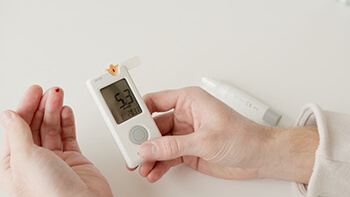Betel leaf, also known as paan ka patta, is a common Indian leaf that's used to make a dish called "pan". This heart-shaped leaf is mostly consumed in India, so you may not have heard of it if you live in the Western world.
Typically, betel leaf is chewed after a meal o freshen the breath. But its health benefits don't stop there. Some people spit out the betel leaf after freshening their breath, but it's best to swallow it - that way, you can enjoy its wide-ranging healthful properties.
In this guide, we'll be sharing the numerous betel leaf uses and the amazing health benefits of betel leaf.
1. Mouth & breath freshener

The oil from the betel nut or leaf helps to prevent tooth decay and keep the gums healthy in the mouth, ensuring overall dental health. The oil produced from chewing betel leaves is well-known for its ability to keep breath smelling fresh, which is why it's often chewed after eating a pungent meal.
Betel leaf extract has even shown promise in preventing oral bleeding in the mouth, reducing oral cancer risk, and maintaining overall dental hygiene - so it's more than just a breath freshener. Just combine a couple of drops of betel leaf oil with a cup of warm water and gargle this mixture in your mouth on a daily basis.
2. Fights against ear pain

We all know how horrendous an ear infection can be - it's only when you're suffering from the pain that you realize how debilitating it is. Luckily, one of the major benefits of betel leaf is its ability to treat ear infections and reduce earache.
For this remedy, you'll need to mix a couple of drops of betel leaf oil with coconut oil, then carefully drip the mixture into your ear. This should clear out the ear and get rid of any pain associated with blockages - but keep in mind that if you have a serious ear infection, you'll need to seek medical advice, diagnosis or treatment from a doctor.
3. Acts as an antiseptic
It makes sense that if betel leaves can reduce the inflammation and pain associated with earache, it's also a good antiseptic and anti-inflammatory. You'd be surprised at just how many natural ingredients have antiseptic properties - and betel leaf is one of them.
Betel leaves contain an oil called chavicol, and this oil has been proven in medicinal studies to be effective in treating patients with arthritis. However, more related research is needed for us to understand the effect of betel as an antiseptic.
4. Works as a deodorant

Whether you're trying to do your bit for the environment, you're dealing with sensitive skin, or a bit of both, you probably avoid commercial deodorants at all costs. Most deodorants available in supermarkets and health stores contain chemicals and plastics that are as bad for our skin as they are for the environment. There are plenty of natural deodorants that work just as well as the popular commercial brands - including betel leaves.
The deodorizing benefits of betel leaf are related to its astringent (drying) properties. It can cause the skin cells to contract, reducing the release of perspiration and preventing the release of the well-known unpleasant sweat odor.
Betel leaf also contains mild antibacterial agents, so it can target the bacteria responsible for sweating and even prevent infections, thus reducing perspiration. It's thought that drinking betel leaves soaked in boiled water should help to reduce your body's sweat production, but it may not have strong enough benefits to eliminate the need for deodorant entirely, unfortunately.
5. Prevents & Treats Nosebleeds
If you're that person who always gets a nosebleed when the air gets hot and humid, this is one of the most important betel leaves for you. Because of their anti-inflammatory properties, betel leaves are said to be particularly useful in treating nosebleeds.
A betel leaf remedy commonly used in India involves lying the nosebleed sufferer on their back, rolling up a betel leaf and inserting it into the bleeding nose. Apparently, the properties of this leaf will stop the bleeding, promoting clotting and preventing continued blood flow. There isn't much science to support this, but it's a widely-used remedy, so it's certainly worth a go.
6. Supports Wound Healing

The anti-inflammatory and antiseptic benefits of betel leaves aren't limited to their ability to treat nosebleeds. Betel leaves are used extensively in India to promote fast wound healing.
To speed up the healing of a cut, infection or graze with betel leaves, just squeeze the juice out of a handful of leaves and use a clean cloth to apply it to the injury. Cover the injury with a bandage. The betel leaf juice should get to work, promoting blood clotting and faster healing.
7. Diuretic
One of the most helpful health benefits of betel leaves is their ability to act as a diuretic, which is especially important for people with kidney conditions. Betel leaves are said to prevent water retention, too, which can be useful if you often experience an excess of fluids in your body. According to Indian natural medicine, you should drink milk mixed with crushed fresh betel leaves to enjoy this particular health benefit of the leaves.
8. Treats respiratory problems

If you're dealing with a non-life-threatening respiratory problem, you may want to consider how betel leaves can support respiratory health. Betel leaves are said to be effective in treating chest congestion and even reducing asthma symptoms.
If you're dealing with a bad bout of congestion or asthma, it's recommended to warm a betel leaf and place it on your chest, which should free you of your symptoms. You can also boil fresh betel leaves with water that contains cinnamon and cardamom, then drink the concoction for additional relief from respiratory issues like asthma.

9. Treats coughs and colds

No surprise that betel leaves can also treat coughs and colds as well as respiratory issues. Betel leaves are fantastic antibiotic and antioxidant agents, which makes them effective in relieving common symptoms of a cough, such as a throat tickle and tightness in the chest.
For this remedy, boil a handful of betel leaves and add cinnamon and cardamom, as you would to treat a respiratory issue, then drink the concoction once0daily until your cough has cleared.
10. Good for skin health

Most of us are guilty of spending far too much money on skin products that claim to do the impossible - clear acne, get rid of dark spots, and even delay the natural process of skin aging. These products don't work for everyone, and they usually contain harsh chemicals that can do more harm than good. Harnessing the antimicrobial and antioxidant properties of betel leaves, however, may be much more effective - and kind to your skin.
Early research suggests that betel leaves can promote acne-free and pimple-free skin, as well as skin smoothness. They may also prevent rashes and dark spots, as well as treating mild cases of sunburn. To use betel leaves as a skin treatment, mix the extract of crushed betel leaf with turmeric, then apply the concoction directly on your skin. Leave for up to 10 minutes before washing off. Repeat daily for the best results.
11. Supports digestive health
People in India commonly eat paan at a wedding or important gathering - but there's no reason to limit it to special occasions! Considering betel leaf is so effective in supporting digestive health, this is something you can benefit from consuming on a daily basis.
Betel leaves are said to have anti-flatulence and gastroprotective properties, meaning they're effective in reducing wind and preventing the gastrointestinal system from coming to harm.
Consuming betel leaves mixed with water and pepper will yield the biggest benefits, but a natural remedy in India involves massaging your stomach with betel leaf oil, which is thought to act as a medicine, releasing carminative acid in the body that supports digestion.
12. Anti-cancer potential
Perhaps one of the most promising health effects of chewing betel quid (made with areca nut and slaked lime) is its anti-cancer potential. While some of the betel leaf medicinal uses have been known since ancient times, it's only recently that Indian medicinal research has discovered a molecule in the betel leaf that may help to reduce the risk of certain cancers and treat patients with a type of cancer that causes the bone marrow to over-produce white blood cells. In these people, their immune system doesn't typically respond to common cancer drugs, which is why the idea that betel leaf could treat the disease is such a breakthrough.
In the study, an alcoholic extract of betel leaves was used to treat chronic myeloid leukemia patients, and its hydroxychavicol proved to be effective as an anti-cancer substance with limited side effects. It's looking likely that betel leaves may be used to treat this disease in the future, as there are currently few medications that prove effective.
13. Anti-diabetic

From one common disease to another - diabetes is incredibly common in adults across the world, and can be very difficult to manage. Emerging medically-reviewed research suggests that betel leaf contains a number of medicinal compounds that may help diabetes patients to better manage their condition.
In a glucose tolerance test, oral consumption of betel leaf was found to decrease blood glucose level, / Not only that but betel leaf has been found to improve conditions related to diabetes, including delayed wound healing, making them a great source of diabetes-friendly compounds for anyone suffering with the condition.
14. Prevents constipation
Another of the best benefits of betel leaf is its ability to act as a constipation medicine, supporting the removal of waste in the body and balance the body's pH. A common Indian betel leaf constipation remedy is to mix betel leaf juice with boiled water, then leave it overnight and drink the next morning.
A slightly less appealing remedy involves making a suppository out of betel leaf and combining it with castor oil to... well, you know the rest. Most people, unsurprisingly, prefer the oral option.
15. Reduces gastric pain
On the topic of digestion, the betel leaf benefits go further than just preventing constipation. Betel leaf is said to help to stabilize pH, as we know already. This prevents excess acid in the gastrointestinal system that's responsible for pain, gas, reflux, a feeling of fullness, and bloating. Because betel leaves can help in removing toxins from the body, they support healthy pH levels and can increase appetite.
16. Relieves joint pain

The last of the betel leaf benefits in this guide looks at betel leaves' ability to reduce joint pain. Betel leaves contain a whole host of anti-inflammatory and antioxidant compounds that can be used to relieve aches and pains in the muscles and joints - whether they're symptoms of a chronic condition like arthritis or osteoporosis, or simply a sign that you worked too hard in your last gym session. It's said that warming a bunch of betel leaves and holding them against the affected area can significantly decrease pain and inflammation.
Conclusion
In India, it's most commonly eaten in the form of 'paan', but betel leaf can be enjoyed all over the world for its endless health benefits. Packed full of a variety of nutrients, from thiamine and riboflavin to vitamin C and carotene, betel leaves are also a fantastic source of calcium.
It's no wonder people have enjoyed the betel leaf benefits since ancient times - evidence shows that whether by chewing or oral consumption, this herb has so much to offer as a natural medicine.
Betel leaf has more benefits than could fit in this guide, too - additional benefits include its ability to stimulate the central nervous system, reduce depression, treat asthma symptoms and much more.
There aren't many side effects of the betel leaf to be aware of. It's worth knowing, however, that it has stimulant properties, similar to caffeine and tobacco, which you may consider one of its problematic side effects.
Another side effect of the betel leaf is allergic reactions, so proceed with caution if you think you're at risk. Betel leaf may even cause oral cancer in the body when consumed in excess. Consult your doctor if you think any of these side effects may impact you.
The piper betel plant is an aromatic creeper, which means it's easy to grow it yourself as an ornamental plant. Having your own piper betel plant to hand means you can benefit from its healthful compounds whenever you like, which is certainly a bonus! You could make your own betel quid from areca nut and slaked lime whenever you wanted to.
If you can't get your hands on betel leaf in your local area, you can buy the dried leaves online - so there's no reason to miss out on the amazing betel leaf benefits.

